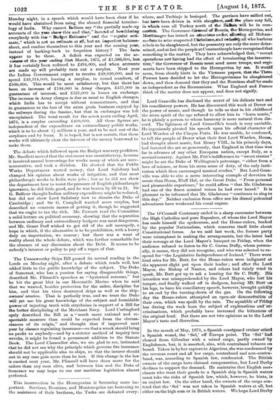The debate which followed upon the Budget wasvery profitless. Mr.
Smollett moved that the statement was unsatisfactory, because it involved annual borrowings for works many of which are unre- munerative, and took a division. He showed that the Public Works Department wasted money, that Lord Salisbury had changed his opinion about works of irrigation, and that most philanthropic works in India were jobs ; but as he did not show the department how to resist the pressure of English philanthropic ignorance, he did little good, and he was beaten by 66 to 21. Sir G. Balfour thought Indian military expenditure might be reduced, but did not show Lord Salisbury how to dismiss the Duke of Cambridge ; and Sir G. Campbell wanted more surplus, but described no concrete means of getting it, though he suggested that we-ought to tax the rich. Mr. Fawcett read the Committee a solid lecture on political economy, showing that the separation between ordinary and extraordinary budgets was most dangerous, and Mr. Grant Duff wished to get rid of the salt monopoly, a hope in which, if the alternative is to be prohibition, with a heavy duty on importation, we concur ; but there was a want of reality about the whole debate, which was further remarkable for the absence of any discussion about the Debt. It seems to be nobody's interest or policy to pay off a rupee of that.






























 Previous page
Previous page